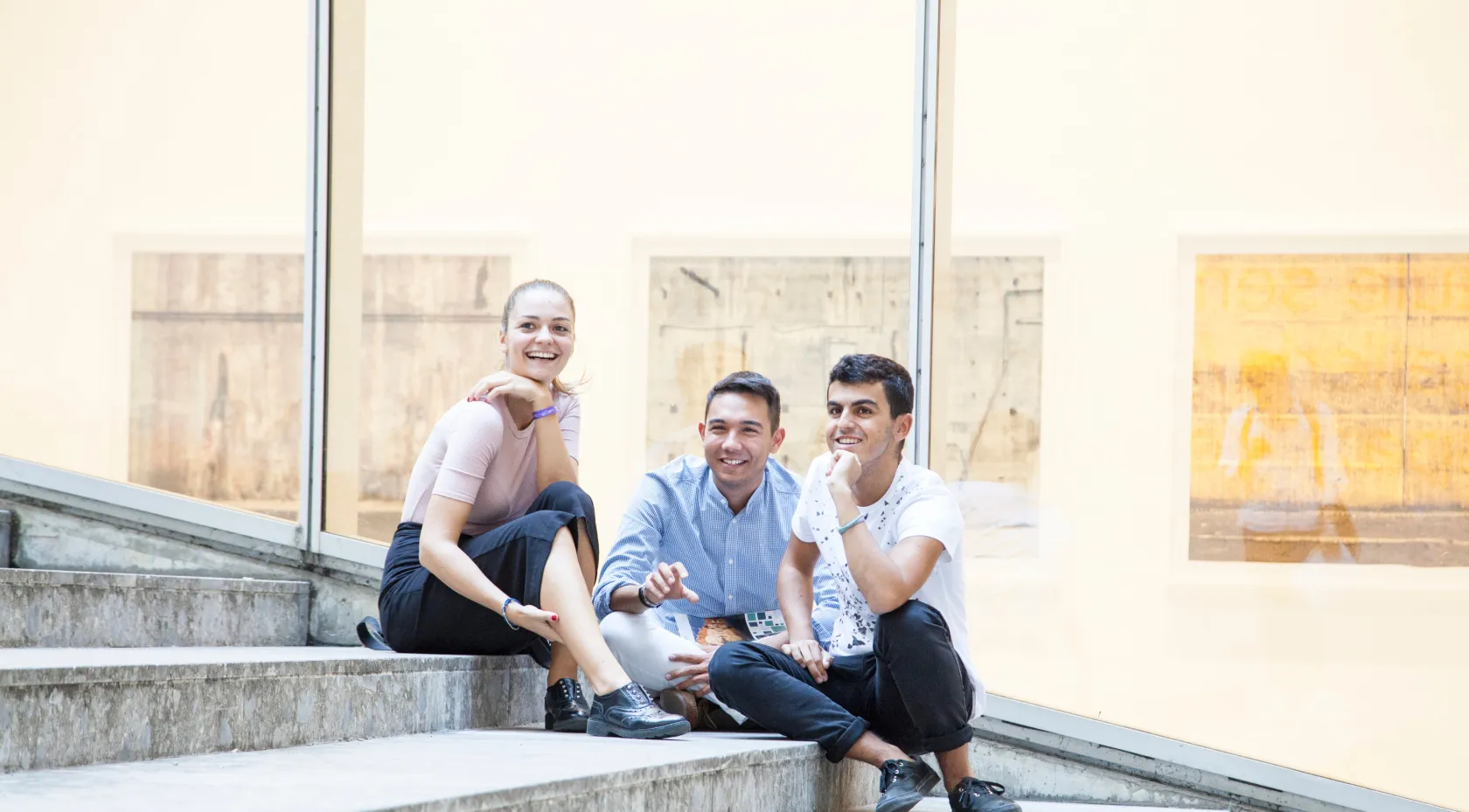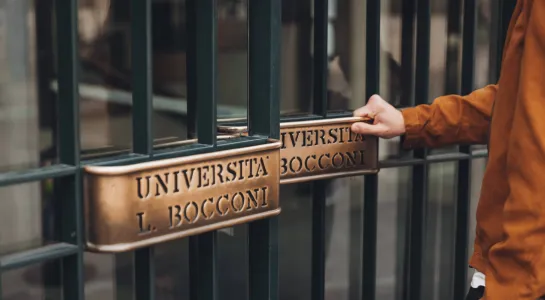
One in Three Students Set to Receive Financial Aid at Bocconi
Already today 25% of Bocconi students benefit from partial or total remission on tuition and fees. “The goal is now to reach 33%,” explains Paolo Cancelli, Director of the Students Outreach & Support Unit. “To achieve this target we have naturally expanded the budget available for financial support of students, but also changed the basket of benefits which are now better calibrated to the economic and financial conditions of families: there are tuition and fees waivers, and scholarships providing accommodation and/or a stipend, but also partial tuitition remissions that reduce costs by 20%, 40%, 60% or 80%.” This package of benefits is called Bocconi4Access to Education and it aims to make attendance at the University attainable by students coming from disadvantaged households, as well as increase access for middle-class students and individuals who have special needs independent of income. The changes will be officially unrolled with academic year 2024-2025, but the University has already started to promote the initiative in recent months to reach out to the students who have already been admitted. “I really wanted to come to Bocconi for its dynamism, internationality and links with the world of work, but I didn't feel like I could ask my mother to make additional sacrifices,” says Cristina Signorelli, a 20-year-old student from Bergamo, who is enrolled in Business Administration and Management. “The scholarship I was given enables me not only to pursue a degree here, but also not have to commute and really experience life on campus, for example by taking part in the activities of associations such as Students for Humanity. I am proof that this kind of higher education can be accessed even by those who might think they don't have the opportunity."
Simpler applications and diversified help
Among the tools implemented by Bocconi to widen the pool of beneficiaries as much as possible there is also a radical reform of the procedure for applying for financial aid. “Those who believe they are eligible for tuition exemptions now have only one application to fill out,” summarizes Cancelli. “We then respond, after an evaluation, indicating what kind of subsidy can be provided and in what amount. We have set ourselves the objective of doing so within eight to ten weeks from the time of application following admission, in order to give families a reasonable estimate of the costs that need to be incurred as soon as possible." An important detail: in the event of non-assignment of the benefit, if families have to backtrack on enrollment, the amount paid up to that point will be refunded.
In the context of facilitating applications and widening the net through which to filter potential recipients, Bocconi4Access to Education divides benefits into specific packages for various "special needs". “Una Scelta Possibile”, for example, is the set of aid to students coming from particularly economically or socially disadvantaged backgrounds. There are also special “Moving to Milan” scholarships which include the assignment of accommodation at a reduced rate, products designed for students with disabilities, partial exemptions for siblings enrolled simultaneously, support programs for student athletes, "Women Awards" intended to encourage female enrollment in STEM subjects, as well as specific initiatives for refugees residing in African countries such as Kenya, Niger, Nigeria, South Africa, Uganda, Zambia and Zimbabwe.
Leah, Elizabeth and Benitha are three African students who started their study path this year thanks to full scholarships funded by a donor and Bocconi's participation in the UNICORE (University Corridors for Refugees) project promoted by the United Nations High Commissioner for Refugees (UNHCR), with the collaboration of the Italian Ministry of Foreign Affairs, Caritas and the Waldensian Diaconia. “As a refugee, I lost everything I had and had to start over,” says Benitha Nzayanga Mugisha, who had to flee Burundi for Kenya when she was 14. “But, as they say, education is something that no one can take away from you and for this, for being here at Bocconi today, I am very grateful.” Benitha chose to attend the Bocconi MSc in Marketing Management. “In the future I would like to work on promoting projects to spread education among the poor and refugees. I would like to become a donor of the UNICORE project myself in the future."
The role of donors
Such a large study aid program would not be sustainable if, in addition to directly providing benefits to students, Bocconi did not also make efforts to promote and catalyze the commitment of companies and individuals to fund certain initiatives. These donors are authentic drivers of several philanthropic activities whose object is to support academic training and whose decisive role shines through discreetly in the recipients’ stories. Lindy Moyo, a student of the LLM in European Business and Social Law, had left Zimbabwe to study International Law in Odessa, but when the war broke out in Ukraine she had to take refuge first in Moldova and then in Bucharest. In January 2023 she arrived at Bocconi for a six-month exchange program dedicated specifically to students from Ukrainian universities and at the end of the experience she applied for the LLM in European Business and Social Law, to which she was admitted with a scholarship supported by alumnus Vittorio Colao. “It's been such an uncertain path for me over the last few years that now every day is positive and I feel so grateful for this opportunity,” Lindy says. “During my exchange I was able to see the validity of Bocconi, the value of teaching and I was welcomed so well that all this convinced me to continue to study here. Here I was also able to work with Professor Catherine Rogers, whom I had met in Bucharest and who has been of great support to me, on issues of international arbitration, an area in which I would like to go on to work."
Anna Tiso, recipient of the full exemption scholarship entitled "Bottega Verde Talent & Need Awards in memory of Paolo Lavino", also found her path thanks to the possibilities offered by the corporate donor. “When I had to choose a university program, there were very few programs on Artificial Intelligence and one of these was at Bocconi,” recalls the student, now in her first year of the Master of Science in Artificial Intelligence. “Thanks to this scholarship I was able to study what interests me, attending the Bachelor of Science in Mathematical & Computing Sciences for Artificial Intelligence and then continuing with the MSc degree. Furthermore, I am now doing an internship as an AI specialist in the donor company that funded the scholarship and this summer I will go to London for another internship. With such help, and sufficient willpower, it is really possible to go beyond one's economic capabilities.”
Promoting access to STEM degrees is also the aim of the "Fasanara STEM Awards" fund created by Bocconi alumnus Francesco Filia, co-founder of the Fasanara Capital investment company based in London. In 2023 Filia created a partnership with the Alma Mater by establishing a support fund, which today supports four female students and one male student. “I really believe in the function of universities as engines of social mobility,” comments Filia. “I myself benefited from it at Bocconi, not because I had a scholarship but because studying here pushed me to leave the provincial dimension of my city and projected me into an international environment, opening up unexpected horizons,” says Filia. “With these scholarships I hope to help other students undertake the same journey.”
Need ahead of merit
Until last year, merit also played a role in the attribution of study benefits at Bocconi. “The Bocconi Merit Award program has offered merit scholarships to attract outstanding international students,” recalls Cancelli. “Now that the influx of international students has consolidated, however, it seems right in our view to allocate this budget to benefits linked to need.” Merit remains a basic parameter in admission, assessed through a test which does not consider the economic situation of the applicant in any way. Benefits are now connected to needs so much so that, even in the years of academic attendance following the first, they are not tied to the achievement of a precise grade point average. “To maintain financial support, we only ask recipients they have an academic progression, that credit objectives are achieved or certain exams are passed. It is an incentive, more than anything, to give a pace to the students and encourage them to complete the program within the expected time frame."
translated by Alex Foti
